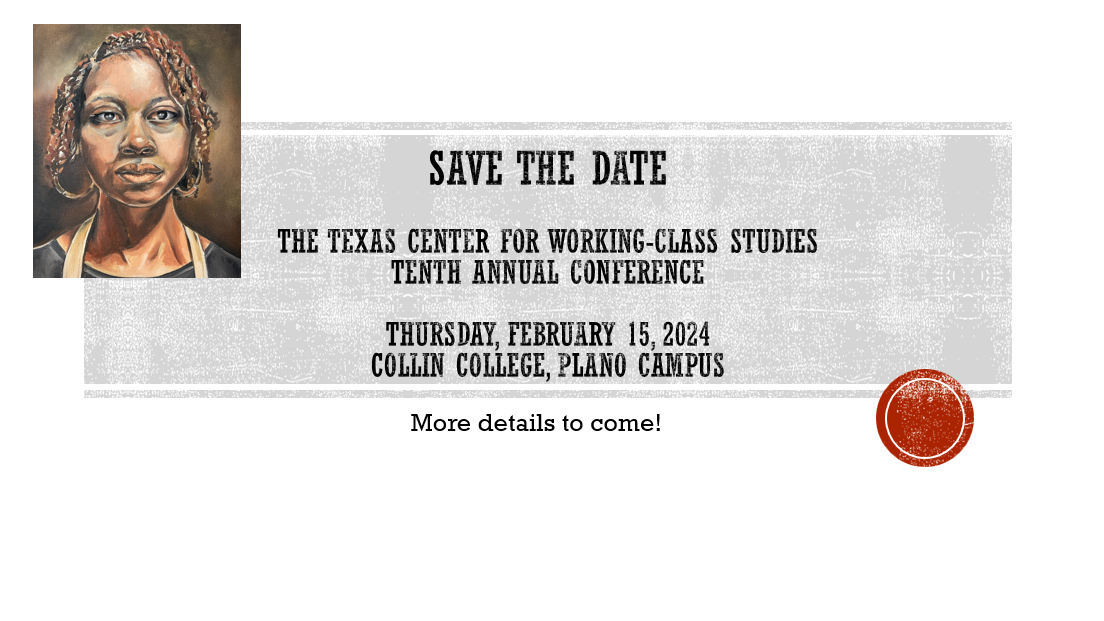Title of Presentation/Proposal/Etc.
Social Class and Identity Session
Start Date
25-2-2021 8:00 AM
Presentation Type
Faculty Presentation
Abstract
Panel discussion with the following:
- Moderator: Justin Jolly, Texas Christian University;
- Sam Tullock, Collin College, “‘Is Small Beautiful?’: The Economics of E.F. Schumacher and Alexander Solzhenitsyn”;
- Lishan Desta, Collin College, “The Social Contract and the American Working Class”;
- Owen Clayton, University of Lincoln (United Kingdom) “‘Laureate of the Logging Camp’: The Representation of Labor and Labourers in the writing of T-Bone Slim”
Justin Jolly, "A Tale of Two Unions: The United Packinghouse Workers of America and the International Aeronautic Machinists in Fort Worth, 1936-1946"
The city of Fort Worth’s website has a section titled “Fort Worth History”. This page outlines the high points of the city’s history from its inception as a military outpost to its current military industry. The website makes no mention of the city’s rich labor history. This omission highlights Fort Worth’s desire to appear to be a model right to work town with little to no union trouble. However, this conclusion is false. One example is the role Fort Worth workers played in the national strike wave of 1946. Both the International Aeronautic Machinists (IAM) at the Consolidated-Vultee’s Aircraft Plant and the United Packinghouse Workers of America (UPWA) at the Armour & Co. Meatpacking Plant went on strike that year. The policies of these two unions—regarding race, gender, and skilled-workers—was drastically different. Despite these differences the labor upheaval of 1946 proved to be a pivotal year where these union’s paths converged into a single goal.
Sam Tullock, "Is Small Beautiful? The Economics of E.F. Schumacher and Alexander Solzhenitsyn"
E.F. Schumacher and Alexander Solzhenitsyn shared a common economic concern, the economic and ethical future of the West. Both envisioned an economic system which emphasized small- scale, community-based business that would avoid the abuses of big government and big business. This paper will explore the viability of a small-scale economics. I particular, the paper will examine Schumacher’s Small Is Beautiful: Economics as If People Mattered and Solzhenitsyn’s commencement speech at Harvard University, 1978. The general theme of this presentation is suggested in a summary statement in Small Is Beautiful.
1. In small-scale enterprise, private ownership is natural, fruitful and just.
2. In medium-scale enterprise, private ownership is already to a large extent functionally unnecessary. The idea of property become strained, unfruitful unjust. If there is only one owner or a small group of owners, there can be, and should be, a voluntary surrender of privilege to The wider group of actual workers… Such an act of generosity may be unlikely when there is a large number of anonymous shareholders, but legislation could pave the way even then.
3. In large-scale enterprise, private ownership is a fiction for the purpose of enabling functionless owners to live parasitically on the labor of others. It is not only unjust but also an irrational element which distorts all relationships within the enterprise. These observations also represent well the concerns Solzhenitsyn expressed about the decline of the West, a decline he saw as predictive of a grave spiritual crisis in the United States. This presentation will explore the positive elements of the thought of these provocative intellectuals, and it will offer a critique of their ideas.
Lishan Desta, "The Social Contract and the American Working Class"
Since the days of the Progressive Era in the late 1800s, a triangular relationship emerged between business, labor, and government in the form of a quasi-social contract. The social contract which has seen many developments since its start has been the basis of America’s sustained economic rise and industrial peace. However, the idea of the triangular social contract came under pressure and started to unravel in the 1980s under pressure from the pro-market reforms led by the U.S. government. As the US government turned away from the social contract, the American working class was left unprotected from the caprices of the business cycles, the of waves of mergers and acquisitions, the powerful winds of globalization, and the mantra of stakeholder wealth maximization. It was the 2008/9 Great Recession and the subsequent rise of working-class populism which exposed glaringly the mistakes of abandoning the social contract. The paper investigates political economy-related ideas how a new social contract can be created that can protect the interest of the working class.
Owen Clayton, "‘Laureate of the Logging Camps’: The Representation of Labor and Labourers in the writing of T-Bone Slim"
In American popular culture, hobos have often been idealised for their freedom of movement. A notable exception to this romantic tendency was the work of the Finnish-American anarchist newspaper columnist and songwriter T-Bone Slim (Matt Valentine Huhta). Slim’s writings were radical interventions in debates around class, labor and exploitation in 1920s and 1930s America. The style and content of his work privilege truth, in contrast to newspaper representations that Slim calls ‘headlies’. His work is deeply satirical, with a scathing wit reminiscent of Mark Twain. Focusing on his representation of food, mobility, and the body, this paper will argue that Slim’s work represents a challenge to the idealistic portrayal of the hobo that appears in many contemporary autobiographies and in later academic scholarship. He challenges the idea that working class people are ignorance or unintelligent through intricate yet accessible wordplay, and by writing eloquently about the intelligence of his readership.
Location
Virtual
Social Class and Identity Session
Virtual
Panel discussion with the following:
- Moderator: Justin Jolly, Texas Christian University;
- Sam Tullock, Collin College, “‘Is Small Beautiful?’: The Economics of E.F. Schumacher and Alexander Solzhenitsyn”;
- Lishan Desta, Collin College, “The Social Contract and the American Working Class”;
- Owen Clayton, University of Lincoln (United Kingdom) “‘Laureate of the Logging Camp’: The Representation of Labor and Labourers in the writing of T-Bone Slim”
Justin Jolly, "A Tale of Two Unions: The United Packinghouse Workers of America and the International Aeronautic Machinists in Fort Worth, 1936-1946"
The city of Fort Worth’s website has a section titled “Fort Worth History”. This page outlines the high points of the city’s history from its inception as a military outpost to its current military industry. The website makes no mention of the city’s rich labor history. This omission highlights Fort Worth’s desire to appear to be a model right to work town with little to no union trouble. However, this conclusion is false. One example is the role Fort Worth workers played in the national strike wave of 1946. Both the International Aeronautic Machinists (IAM) at the Consolidated-Vultee’s Aircraft Plant and the United Packinghouse Workers of America (UPWA) at the Armour & Co. Meatpacking Plant went on strike that year. The policies of these two unions—regarding race, gender, and skilled-workers—was drastically different. Despite these differences the labor upheaval of 1946 proved to be a pivotal year where these union’s paths converged into a single goal.
Sam Tullock, "Is Small Beautiful? The Economics of E.F. Schumacher and Alexander Solzhenitsyn"
E.F. Schumacher and Alexander Solzhenitsyn shared a common economic concern, the economic and ethical future of the West. Both envisioned an economic system which emphasized small- scale, community-based business that would avoid the abuses of big government and big business. This paper will explore the viability of a small-scale economics. I particular, the paper will examine Schumacher’s Small Is Beautiful: Economics as If People Mattered and Solzhenitsyn’s commencement speech at Harvard University, 1978. The general theme of this presentation is suggested in a summary statement in Small Is Beautiful.
1. In small-scale enterprise, private ownership is natural, fruitful and just.
2. In medium-scale enterprise, private ownership is already to a large extent functionally unnecessary. The idea of property become strained, unfruitful unjust. If there is only one owner or a small group of owners, there can be, and should be, a voluntary surrender of privilege to The wider group of actual workers… Such an act of generosity may be unlikely when there is a large number of anonymous shareholders, but legislation could pave the way even then.
3. In large-scale enterprise, private ownership is a fiction for the purpose of enabling functionless owners to live parasitically on the labor of others. It is not only unjust but also an irrational element which distorts all relationships within the enterprise. These observations also represent well the concerns Solzhenitsyn expressed about the decline of the West, a decline he saw as predictive of a grave spiritual crisis in the United States. This presentation will explore the positive elements of the thought of these provocative intellectuals, and it will offer a critique of their ideas.
Lishan Desta, "The Social Contract and the American Working Class"
Since the days of the Progressive Era in the late 1800s, a triangular relationship emerged between business, labor, and government in the form of a quasi-social contract. The social contract which has seen many developments since its start has been the basis of America’s sustained economic rise and industrial peace. However, the idea of the triangular social contract came under pressure and started to unravel in the 1980s under pressure from the pro-market reforms led by the U.S. government. As the US government turned away from the social contract, the American working class was left unprotected from the caprices of the business cycles, the of waves of mergers and acquisitions, the powerful winds of globalization, and the mantra of stakeholder wealth maximization. It was the 2008/9 Great Recession and the subsequent rise of working-class populism which exposed glaringly the mistakes of abandoning the social contract. The paper investigates political economy-related ideas how a new social contract can be created that can protect the interest of the working class.
Owen Clayton, "‘Laureate of the Logging Camps’: The Representation of Labor and Labourers in the writing of T-Bone Slim"
In American popular culture, hobos have often been idealised for their freedom of movement. A notable exception to this romantic tendency was the work of the Finnish-American anarchist newspaper columnist and songwriter T-Bone Slim (Matt Valentine Huhta). Slim’s writings were radical interventions in debates around class, labor and exploitation in 1920s and 1930s America. The style and content of his work privilege truth, in contrast to newspaper representations that Slim calls ‘headlies’. His work is deeply satirical, with a scathing wit reminiscent of Mark Twain. Focusing on his representation of food, mobility, and the body, this paper will argue that Slim’s work represents a challenge to the idealistic portrayal of the hobo that appears in many contemporary autobiographies and in later academic scholarship. He challenges the idea that working class people are ignorance or unintelligent through intricate yet accessible wordplay, and by writing eloquently about the intelligence of his readership.


